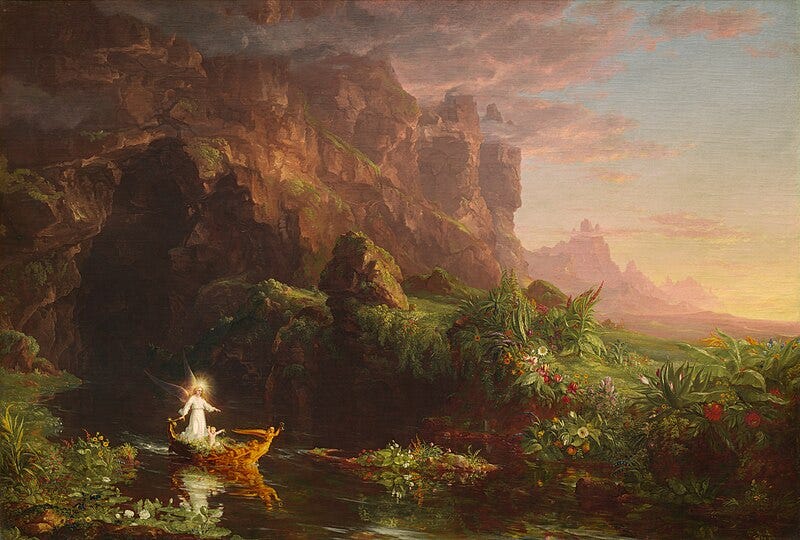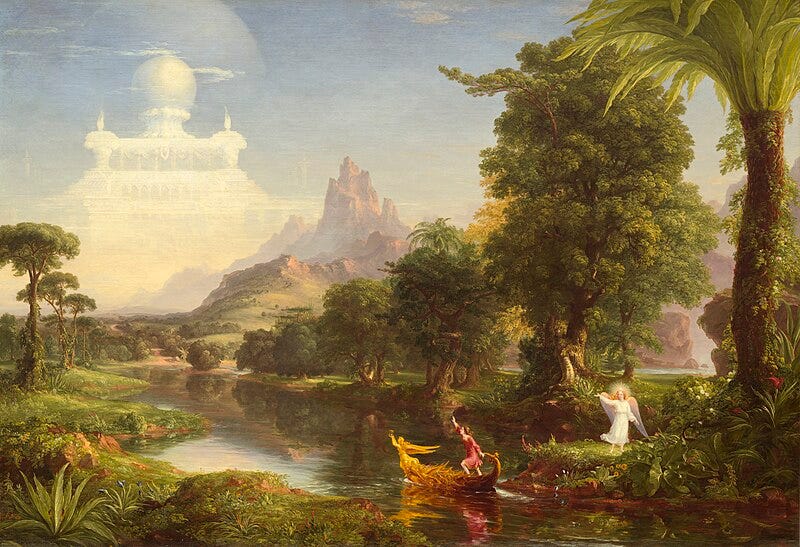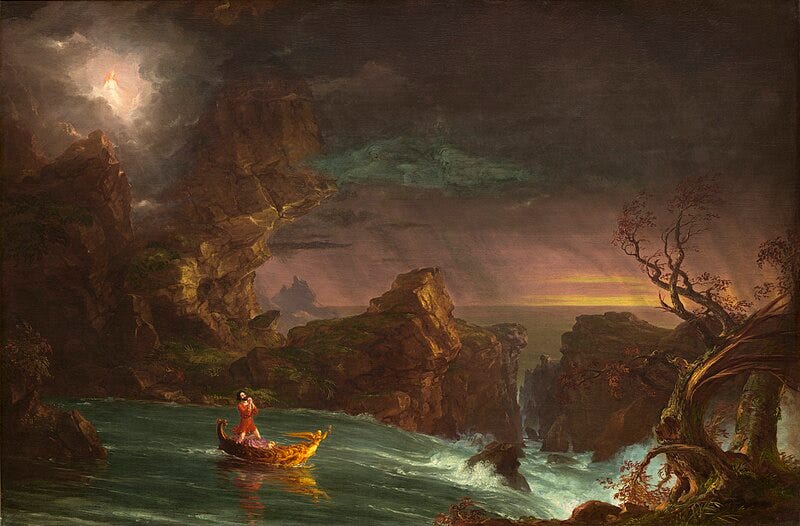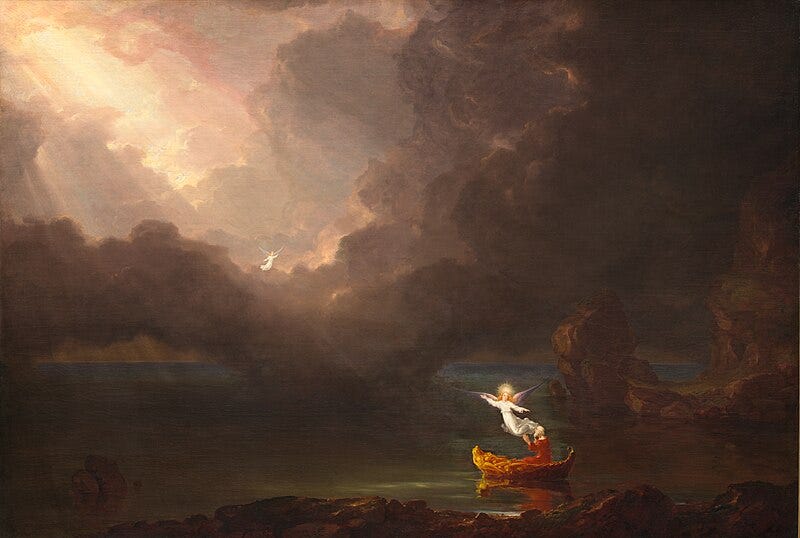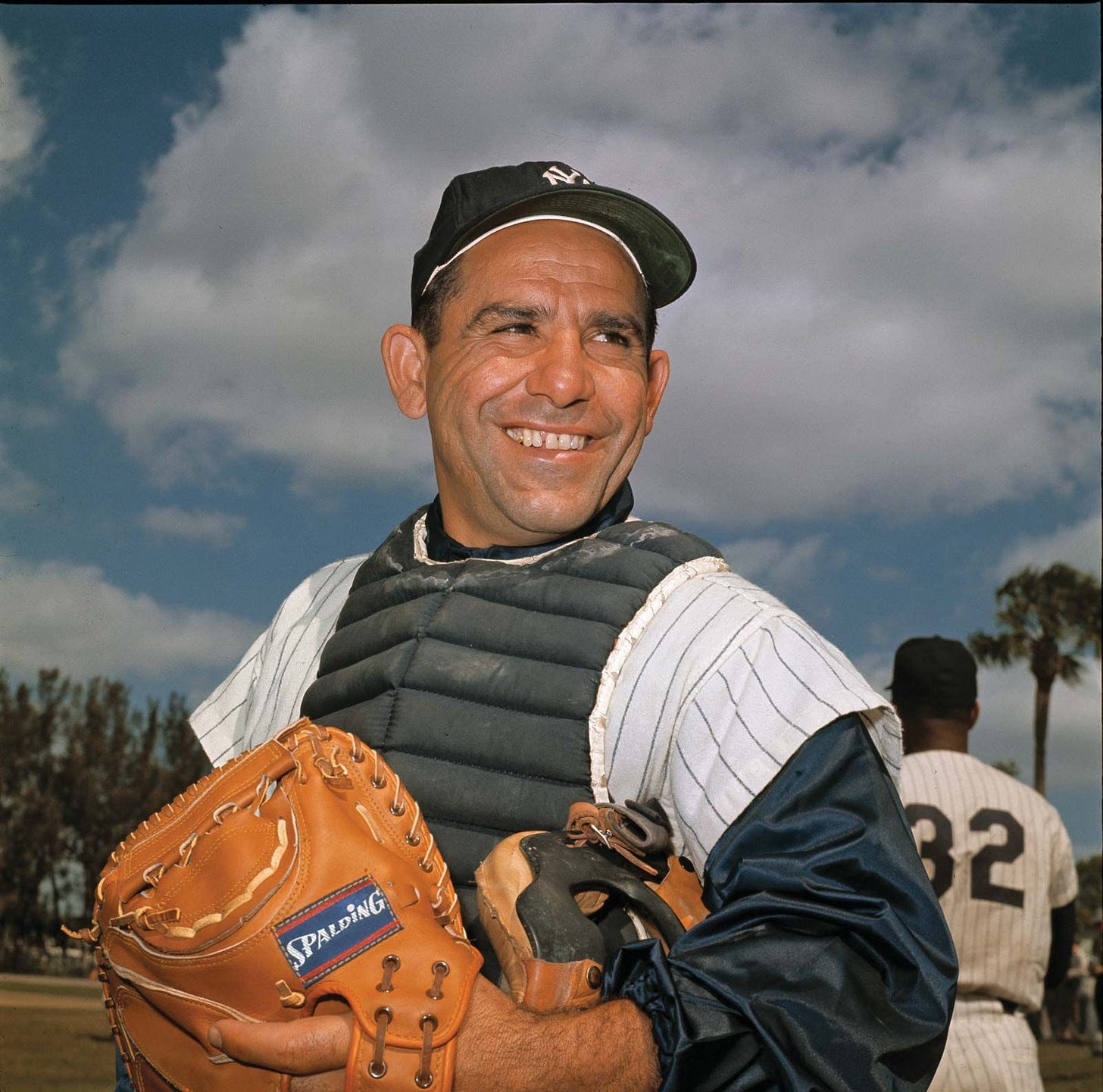Postcard: Journey
No. 002 - on roads and what they say about us.
Postcard is a weekly curation of things I think are beautiful or interesting. Each postcard will be named after a word and contain something to listen to, something to look at, and something to think about. As this is something new I’m trying, I welcome you to share any thoughts in the comments. Thank you!
Postcard: Journey
journey (n. & v.):
A ‘spell’ or continued course of going or travelling, having its beginning and end in place or time, and thus viewed as a distinct whole (n.)
To make or proceed on a journey; to travel (v.)
†Meanings from the Oxford English Dictionary (OED)
Something to listen to:
The Road goes ever on and on
Down from the door where it began.
Now far ahead the Road has gone,
And I must follow, if I can- Excerpt from “The Road Goes Ever On” in The Fellowship of the Ring, J.R.R. Tolkien
Something to look at:
Thomas Cole, an American landscape painter and master of Romanticism, created a series of four paintings titled The Voyage of Life in 1840 on commission. A dispute with the owner of the paintings about a public exhibition led to him doing a second set of the series in 1842 intended for public display; those renditions are shared below.
Something to think about:
(This essay was recorded stream-of-conscious using text to speech while I was driving alone on a roadtrip. It is presented with minimal edits for transcription errors and readability.)
Roads are not just traveled on, they are slept on. Roads represent—in the most fundamental sense of the word—the civilizational aspirations of humanity. Roads are something that are useful but also abstract, in that they have no value inherently on their own. A road’s worth is measured by the goods and travelers that walk on it. Roads are a thing that needs to be maintained, they are something that needs to be rebuilt again and again and again. The fact that a road is never finished is itself reflective of civilization. There is no end state, there is no end of history… we cannot ever transcend the limitations of the material world nor can we transcend the spiritual limitations of the default culture.
As I drive on a beautiful highway, I feel a sense of—cheesy as this may sound—the indomitable American spirit… that same sense of wonder and exploration that carried our ancestors across the ocean and then across the country, entering hostile unexplored territory to create the most beautiful and prosperous empire that has ever been created. The American empire is a global empire, the apotheosis of every great civilization before it and it is possible—maybe not probable but certainly possible—that America will be the enduring great civilization of humanity, a shining jewel that lasts for as long as we do. Of course, it is also possible that America will decline and collapse under its own growth and malaise. It does seem like we have forgotten so much about what it means to be great, what it means to be ambitious, what it means to be aspirational… and if America does collapse, it will be an incredibly powerful lesson about the limitations of liberalism, about the fact that true culture is not a meme, it’s not something that you can take for granted, and that people who have no real ties to bind them together will invariably dissolve into self-interest and self-dealing. If America does ever collapse, though, I have a strong suspicion it might be the case study that launches the next great civilization, the next great empire. In that sense, America is a trampoline and an incubator… and eternal, something that can never truly die.
I think it is a blessing it is to be alive in a very interesting and meaningful time, full of both opportunity and hardship. It would be easy to give into cynicism, to demand that our ancestors somehow change in the past the world that we have inherited, but we must reject the easy, low-hanging fruit of griping and complaining, and instead have the mindset that we can plant the trees, plant the seeds of the trees that will become the forests of the future.
One of the sicknesses that people catch from the default culture is this pathological sense of keeping all of your options as open as possible at all times. If you think about our lives as a map of roads and branches, highways exits and on-ramps, you would instantly understand how foolish it is to try to keep your options open. Fundamentally, to get somewhere you have to drive past other options, ignore off ramps, and to make choices at Forks in the Road. But in the default culture people are afraid to commit—they are actually taught that having your options open is a virtue and that indecisiveness is a good thing. There’s many, many structures in modern culture that are set to reinforce optionality at the cost of agency and decisiveness.
I think about the typical college experience where academic advisors tell freshmen, “Hey, don’t decide your major too quickly, take your time and explore, take a bunch of useless classes electives to figure out what your passion is,” as if passion is some kind of engine of meaning and creativity in life. The truth as I see it is creativity can come from only two places: it can come through hard, hard work and it can come from God… divine inspiration. The thing is, you cannot control the latter, you can merely be open to the possibility of it. So that leaves hard work as the only reliable source of creative output and hard work comes to fruition from discipline and dedication, not passion. Passion, I think, is a word and a concept that has been wholly co-opted by advertisers, a shorthand reference to a sense of incompleteness, which is the very feeling they want to put inside of us to trick us into buying more things.
Is that paranoid? Perhaps. But I know that every off-ramp I ignore, driving past billboards and rest stops as they call like sirens, will take me closer to my destination. I intend to get there.
“When you come to a fork in the road… take it.” - Yogi Berra


